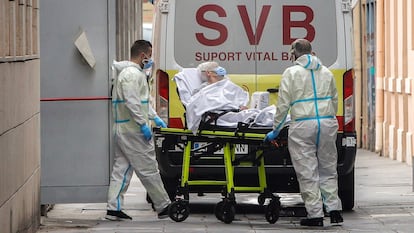Spain reports first rise in weekend coronavirus cases in five weeks
The Spanish Health Ministry recorded 21,309 new infections on Monday and added 389 Covid-19-related deaths to the official toll

The spread of the coronavirus in Spain has been on a downward trend for five weeks, but a growing number of indicators suggest that this has now come to an end. If Friday was the first day the incidence rate rose in a month, Monday was the first day since November 2 that the number of coronavirus cases rose with respect to the previous Monday, which covers figures from Saturday and Sunday, as data is not released over the weekend.
Although epidemiologists are cautious and do not like to establish trends until the figures are consolidated, the rise reported by the Spanish Health Ministry on Monday is significant. According to the latest report, 21,309 new coronavirus cases have been registered since Friday, 3,628 more than last Monday and 1,330 more than the Monday before that. The 14-day cumulative number of cases per 100,000 inhabitants has also risen to 193.6, up from 189 on Friday. The hospital occupancy rate of Covid-19 patients has also increased slightly after falling nonstop since November 16. Coronavirus patients now occupy 9.61% of all hospital beds in Spain. The Health Ministry added 389 Covid-19-related fatalities to the official toll, which now stands at 48,013.
If we are having these small spikes now, I don’t know what will happen during ChristmasRafael M. Ortí Lucas, president of the Spanish Society of Preventive Medicine, Public Health and Hygiene
The rise has been especially pronounced in the Balearic Islands, which have gone from being the region with the second-lowest incidence rate in all of Spain to having a 14-day cumulative number of cases per 100,000 inhabitants of 280 – significantly higher than the Spanish average. In a bid to contain the spread, the Balearic regional government announced on Monday tougher coronavirus restrictions for the island of Mallorca, including a 10pm curfew for the next two weeks, even on Christmas Eve and New Year’s Eve.
Madrid, Catalonia, Extremadura and the Canary Islands also reported a notable rise in contagions. The Canary Islands, which continues to have the lowest incidence rate in Spain (116), will maintain the six-person limit on social gatherings, except in Tenerife, where the limit is four.
It is not likely that the rise in cases is related to the recent national and regional public holidays on December 7 and 8. Only a week has passed since the long weekend and contagions are not typically reflected in the figures until 10 days after they happen. Rafael M. Ortí Lucas, the president of the Spanish Society of Preventive Medicine, Public Health and Hygiene (Sempsph), said the rise is more likely connected to shopping in November and early December ahead of Christmas, and the relaxation of coronavirus restrictions in some regions. The health expert said he was certain the downward trend was over, and was pessimistic about the evolution of the epidemiological curve. “If we are having these small spikes now, I don’t know what will happen during Christmas,” he warned.
Spain is heading into the Christmas holiday season with a much higher incidence rate than it had at the beginning of summer
Speaking at a government press conference on Monday evening, Fernando Simón, the director of the Health Ministry’s Coordination Center for Health Alerts (CCAES), referred to the rise as a “stabilization in the ongoing fall” that has been reported until now. “It is probably due to the relaxation of some measures before Constitution Day,” he said, in reference to December 7 which was a public holiday in several regions. Simón called the situation “delicate” because it was still not clear what impact the recent public holidays or Christmas celebrations will have on the figures. Spain is heading into the Christmas holiday season with a much higher incidence rate than it had at the beginning of summer. “The risk of overwhelming the system because of any small rise is higher than we would like it to be,” he said.
There are concerns that Spain will begin its coronavirus vaccination drive while dealing with a spike in new cases. Simón acknowledged that this could cause problems, for example, if transmission rates are high, a person who has recently contracted the disease may be vaccinated and wrongly believe the vaccine has not worked.
English version by Melissa Kitson.
Tu suscripción se está usando en otro dispositivo
¿Quieres añadir otro usuario a tu suscripción?
Si continúas leyendo en este dispositivo, no se podrá leer en el otro.
FlechaTu suscripción se está usando en otro dispositivo y solo puedes acceder a EL PAÍS desde un dispositivo a la vez.
Si quieres compartir tu cuenta, cambia tu suscripción a la modalidad Premium, así podrás añadir otro usuario. Cada uno accederá con su propia cuenta de email, lo que os permitirá personalizar vuestra experiencia en EL PAÍS.
¿Tienes una suscripción de empresa? Accede aquí para contratar más cuentas.
En el caso de no saber quién está usando tu cuenta, te recomendamos cambiar tu contraseña aquí.
Si decides continuar compartiendo tu cuenta, este mensaje se mostrará en tu dispositivo y en el de la otra persona que está usando tu cuenta de forma indefinida, afectando a tu experiencia de lectura. Puedes consultar aquí los términos y condiciones de la suscripción digital.









































